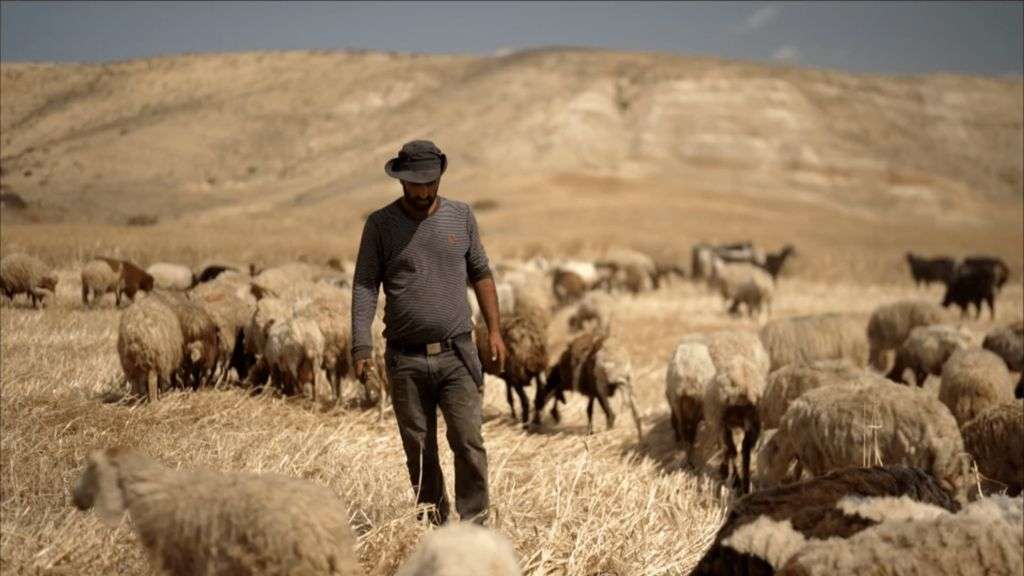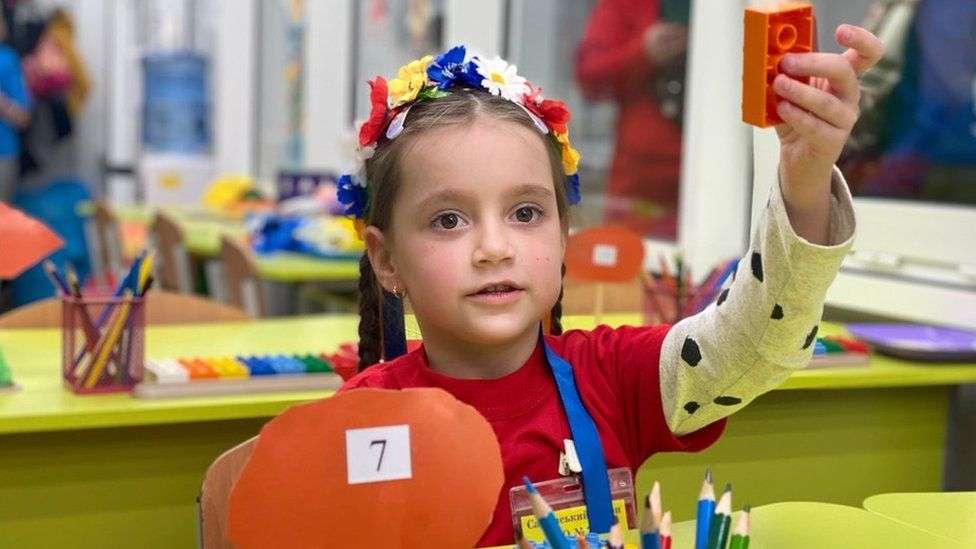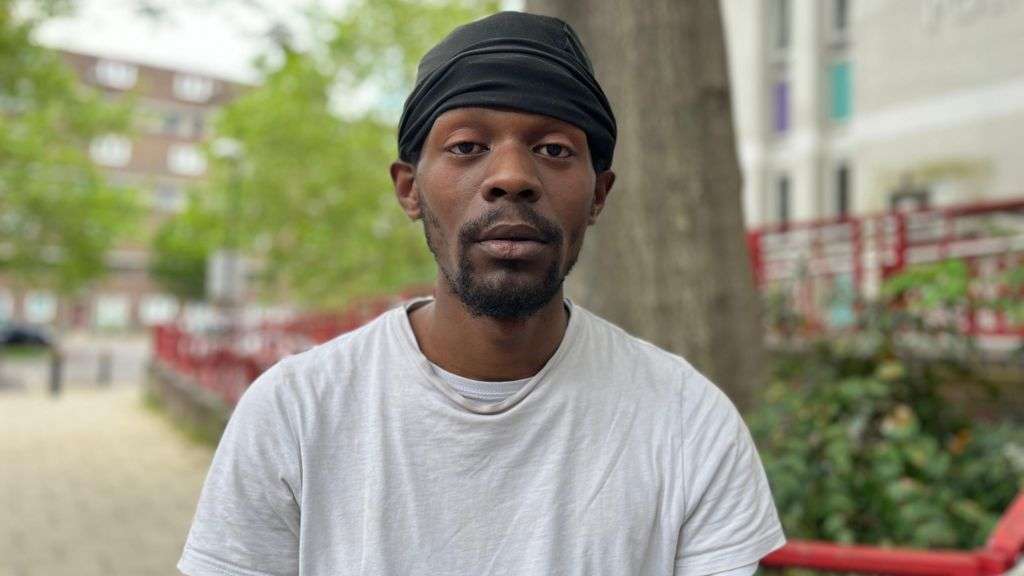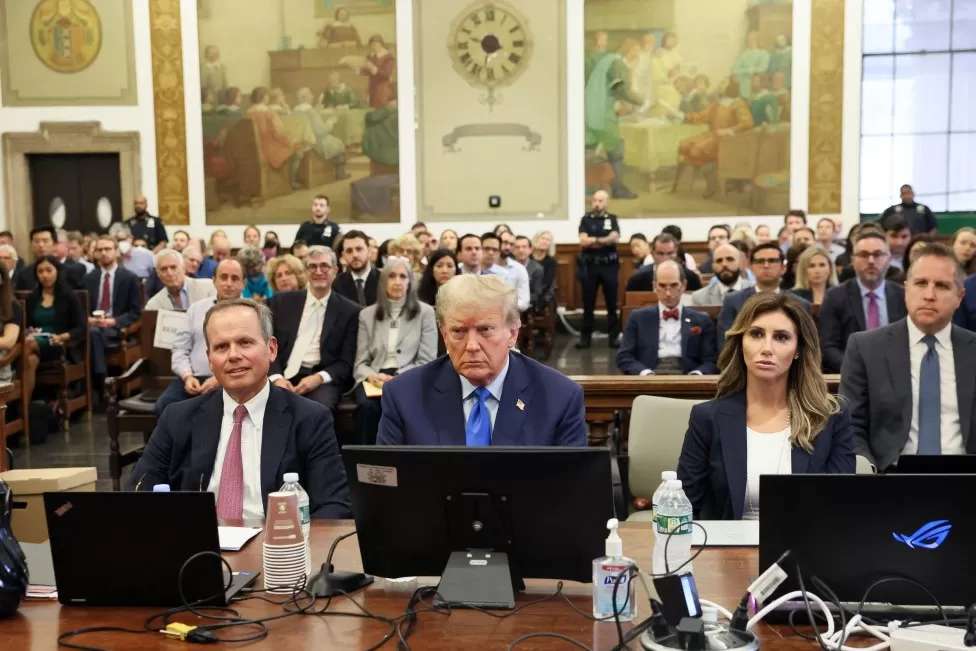Like every morning, there was tension.
It crackled in the air like static. So much was happening lately that only a fool would walk into the hills and not be on their guard.
The sun was already high, pulsing heat across the stillness of the land. There was the sound of the animals’ bells, men and boys whistling to call in the dogs.
High on the hill opposite was the Jewish settlement of Rotem. Close by was an Israel Defense Forces (IDF) post. There to protect the settlers.
Anybody looking down would see the gathering at Ahmad Daraghme’s home: the Palestinian shepherd; the Israeli activists who support him; the foreign journalists with their camera.
Chatting to Ahmad was a 71-year-old Jewish man who regularly accompanies the shepherd into the hills, in spite of violence and harassment.
A man who, I sense, is not going to back down from any fight he believes to be righteous. “When I am convinced that my positions are true, I am ready to fight for my beliefs. Call it stubborn? All right,” says Gil Alexander.
He belongs to the Jordan Valley Activists, a group of Israelis committed to protecting Palestinians. They accompany shepherds to and from the grazing lands.
Maybe the settlers would appear around al-Farisiyah this morning, maybe not. The harassment was more frequent since Hamas attacked Israel on 7 October, killing about 1,200 Israelis and kidnapping 251.
Settler violence that had been going on for years in the West Bank was escalating sharply, aimed, the Palestinians believe, at driving them off the land.
According to OCHA - the UN office for Humanitarian Affairs - there have been more than 1,000 attacks by settlers against Palestinians since October, with at least 1,390 people - including 660 children - displaced.
Lethal violence has frequently accompanied the attacks. OCHA recorded 107 that led to Palestinian fatalities and injuries, 859 causing damage to Palestinian property.
Thousands of trees and saplings belonging to Palestinians have been destroyed. Farmers like Ahmad describe how access to water for families, crops and herds is regularly blocked or limited.
International attention has been focused on Gaza, but the scale of settler violence prompted the US, the EU and Britain to impose sanctions on some settler leaders and, for the first time, against entire settler outposts.
The activists in the Jordan Valley understand that the important thing is to stay calm. No matter how much provocation there is.
Gil Alexander knows what the settlers are capable of, even when no resistance is offered. He has the scars to prove it. But this morning he is upbeat.
“A day like this,” he says, “it makes me feel good. If we can prevent attacks that gives me satisfaction.”
Gil has become a good friend of Ahmad Daraghme, who’s been harassed repeatedly. Ahmad accuses the Israeli army and police of taking the side of the settlers, a claim supported by numerous reports by Israeli and Palestinian human rights activists.
Pointing to the hills, around him, down to the main road, Ahmad says: “The problem is…all this land is forbidden for us. This hill is forbidden, all of it is forbidden. This situation is a mess: it doesn’t matter if we have permission or we don't, they are always creating problems for us.”
We climbed up into the hills, over rocks and gullies, until a valley opened out below us. The land was auburn coloured, covered with dried stalks of recently cut corn, good fodder for hungry sheep.
Ahmad was ahead of us on his donkey, leading the flock towards the grazing land, as his forefathers had done for generations.
A mountain deer flickered through the heat haze and vanished. The picture was of a pastoral eden. In reality it is a bitter battleground.
Last December Gil Alexander and another activist were with Ahmad when settlers attacked at night. They were badly beaten and pepper sprayed.
In an incident elsewhere in the valley Gil collapsed to the ground trying to prevent a settler from scattering a Palestinian flock.
He has experienced constant threats. The fact that he is a devout religious Jew infuriates the settlers, who believe the West Bank - the ancient lands of Judea and Samaria - belong to the Jewish people.
Gil is the son of French Jews and emigrated to Israel when he was 20. His father fought in the French Resistance against the Nazis. “I feel like a representative of a humanitarian religious Judaism,” Gil says. "There are few today in Israel."
The Palestinians like Ahmad Daraghme have lived under occupation since Israel conquered the territory in the Six Day War of 1967.
Since then over 160 settlements have been built in the Occupied Territories - including East Jerusalem - with around 700,000 Jewish residents. There are approximately three million Palestinians in the West Bank and East Jerusalem.
For Gil Alexander, who describes himself as a Zionist, Israeli territory should end at the 1967 borders. Any settlements in the West Bank should only exist with Palestinian consent.
”We can love this land without being the owners, the sole owners of the land… In order that we are not constantly holding the local population by force, we should give away part of this land, in the hope that we will be able to get there freely later on.”
Gil says only this can avoid “the national religious conflict that has existed for 100 years, since Zionism existed, between the Palestinian population and the Jewish population”.
Although Gil believes “nothing is impossible” such an idea seems far-fetched in the bitter politics of the present.
Israel now has the most right-wing government in its history. Prime Minister Benjamin Netanyahu depends on the support of pro-settler parties for the survival of his governing coalition.
Recently Israel’s far-right Finance Minister, Bezalel Smotrich, spoke of "mega-strategic" moves to expand settlement activity with government funding.
Three weeks ago the government declared nearly 3,000 acres in the Jordan Valley as "state land" - the largest such amount in three decades.
It comes on top of a similar declaration of nearly 2,000 acres in the area in March.
The top UN court - the International Court of Justice - has described the Israeli occupation as "de-facto annexation" and in breach of the Convention on the Eradication of Racial Discrimination which condemns “racial segregation and apartheid".
Ahmad Daraghme knows how it works on the ground.
Speaking of his old grazing pastures, he says: “All these areas, all these places, we are not allowed to reach them. Some have been planted with olive trees. Some became reserved areas…They want us to leave this area. They want to be here. They don't want us to be here.”
The political momentum is with the settlers.
Israel’s parliament, the Knesset, recently voted by a majority of 68 to nine to reject a Palestinian state on the West Bank on the basis that it “would pose an existential danger to the State of Israel and its citizens, perpetuate the Israeli-Palestinian conflict and destabilise the region”.
Mr Netanyahu has repeatedly stated that Israeli security control over the West Bank is essential for the country’s safety.
To someone like Shai Rosengarten, people like the Jordanian Valley Activists are "radicals" who should stay out of the West Bank.
He says “the settlements in Israel are very important, because we think that in Israel, we have to connect to our heritage”.
Coincidentally, like Gil he is descended from Holocaust survivors.
His grandfather arrived in Israel from Poland in the years after the war.
Shai is a leading figure in the Zionist organisation Im Tirtzu which supports the settlements. Settler violence, he says, is only carried out by a minority. He claims that what he calls "radical" human rights activists are the problem.
“We see them as radical. And we see their activity as interrupting military activity. So this is very bad for the area.”
I asked Shai if what he really meant was that it was bad for the settlers?
“No, I actually mean that they are interrupting military activity. Of course, they're trying to harass settlers, but they're also trying to harass soldiers. And we have many examples of those kinds of activities coming in front of Israeli soldiers, and just, you know, put their camera in front of their face.
"And you know, this is very, very harming and this is very bad for the Israeli soldiers that need to concentrate on what is happening."
Gil adamantly rejects such a characterisation and argues that he is defending true Jewish values.
He is part of an Israeli minority who have little political influence at the moment. But standing in the shade of an Acacia tree, with Ahmad rounding up the sheep and goats to corral them for the night, Gil Alexander insisted there was hope for a peaceful end to a conflict that he believed had no military solution.
“We have no choice… War, it’s obvious, will provide nothing. From war to war, we are weaker and weaker… Even our strength has limits.”








